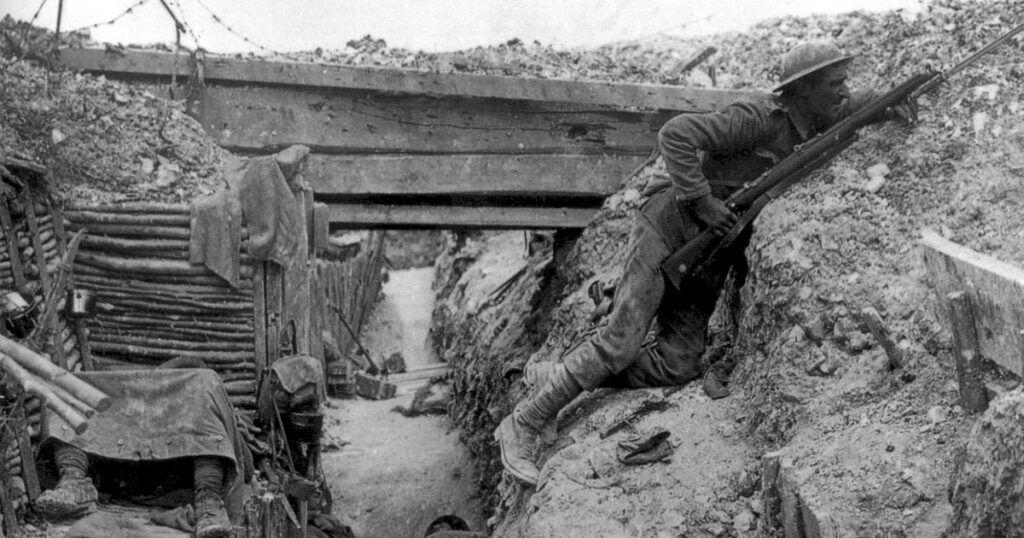
Soldiers Don’t Go Mad: A Story of Brotherhood, Poetry, and Mental Illness During the First World War by Charles Glass; Penguin Press, 352 pp., $29
Always, in wars, there are the things we don’t see coming. World War I had a lot of them: airplanes, machine guns, barbed wire, tanks, flamethrowers, and super-high-explosive artillery shells—the blooming, booming fruit of 19th-century scientific progress. So much had progressed except, alas, the nervous systems of the soldiers, many of whom met the challenge of the new, improved warfighting with nightmares, paralysis, trembling, mutism, hallucinations, terror, stammering, and blindness. Shell shock. What we now call posttraumatic stress disorder. This, too, no one saw coming. By December 1914, only five months into the war, Britain’s frontline army had lost 10 percent of its officers and four percent of its enlisted men to “nervous and mental shock.”
They went mad.
The title of long-time war correspondent Charles Glass’s new book, Soldiers Don’t Go Mad, is an ironic line from a poem by Siegfried Sassoon. Along with another lieutenant, Wilfred Owen, Sassoon is one of a number of Britain’s poet-soldiers whom Glass describes. Sassoon was a product of Cambridge with passions for poetry and cricket, as well as a decorated and wounded war hero nicknamed “Mad Jack” for his daring. When he issued a public statement against the conduct of the war, the military dodged the outrage of court-martialing a winner of the Military Cross by declaring him insane and committing him to Craiglockhart, an aristocratic health spa near Edinburgh that was taken over by the military for the treatment of shell-shocked officers. From there he wrote verse about his comrades: “I see them in foul dug-outs, gnawed by rats, / And in the ruined trenches, lashed with rain …” He also campaigned to return to them in combat. In 1918, he succeeded and was wounded again.
Owen was a middle-class shell-shocked hero and a poet with a gift for Keatsian surprise. When on leave from Craiglockhart, Sassoon introduced him to the wonders of upper-class bohemian social life in Edinburgh and edited his poems—the ones that made Owen famous were written in just over a year. They included this description of a gassed soldier hauled away in a wagon:
If you could hear, at every jolt, the blood
Come gargling from the froth-corrupted lungs
Bitter as the cud
Of vile, incurable sores on innocent tongues,—
My friend, you would not tell with such high zest
To children ardent for some desperate glory,
The old Lie: Dulce et decorum est
Pro patria mori.
The Latin is from Horace, meaning, “It is sweet and proper to die for one’s country.”
At Craiglockhart, the battered officers met with psychiatrists and struggled through a jumble of therapies. One psychiatrist, a classicist, based his practice on a drawing of Hercules wrestling Antaeus. He prescribed cold swims and work. Another shared Freud’s theory that dreams were wish fulfillment—until he heard the recurring horrors of shell-shock nightmares. The patients also raised vegetables, played golf and cricket, developed photographs, and published a journal. Evenings, they put on plays and concerts. After lights out, the hallways rang with screams from their nightmares.
One theory held that the severity of the psychological damage these officers sustained was a side effect of war in the trenches—positions where soldiers felt trapped. Even when on leave in Edinburgh, they still felt trapped enough to dive for cover when buses backfired, and a signal cannon every day at one p.m. was a particular terror until Craiglockhart had it silenced. The reward for successful recovery was a return to the trenches. Craiglockhart excelled at this, returning 42 percent of its officers to combat, compared with 7.1 percent of soldiers treated at Royal Victoria Hospital on England’s south coast. One of the successes was Owen, who was returned to combat and killed a week before the war ended.
Glass eschews easy ironies, but in so doing he heightens the reader’s awareness of them. The casual assembly of copious research seems at odds with the horrible chronology that unfolds. There’s a passivity here. Psychiatric regimens get mentions rather than analyses, and Glass seems not at all exhilarated by the wonderful and moving poetry these soldiers left behind. He lets the history speak for itself. “Many of the ‘cured’ officers from Craiglockhart suffered trauma for the rest of their lives,” he writes in an epilogue. “One, Captain John ‘Harry’ Burns of the Cheshire Greys Regiment, trembled so much that he could barely hold a cup of tea.” His daughter recalled: “I will always remember horrific shouting and screaming in the night and my mother trying to calm him down.”
Ultimately, tragically, ironically, the war succeeded only in provoking World War II, where even more people would die, maybe too many for poetry to make the same mark.


